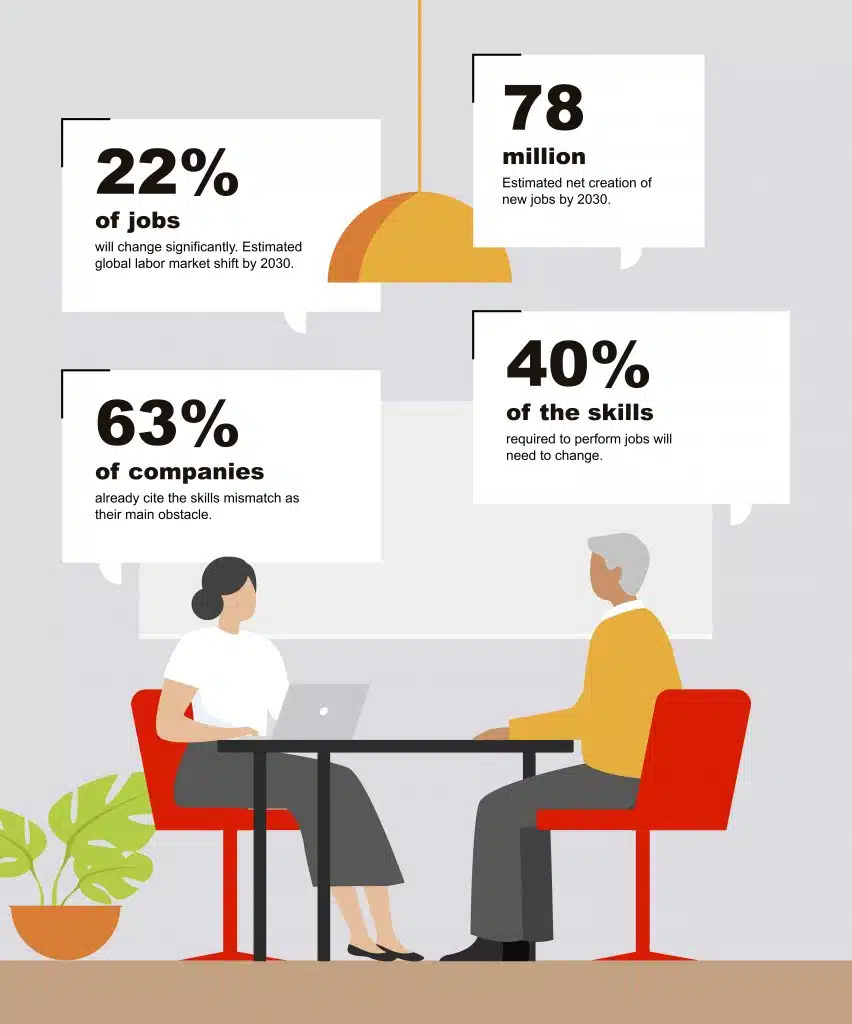SUSTAINABILITY | 09.16.2025
Creating Quality Jobs as a Global Challenge
Unemployment remains one of the world’s biggest challenges, especially for young people and groups facing the greatest barriers to entering the workforce. Advancing toward decent, sustainable employment requires combining active policies with strong corporate commitment. Today, companies play a central role in creating opportunities and promoting inclusion in the labor market.
In a context marked by inequality, job insecurity, and informal economies, ensuring decent and sustainable work is a key challenge in building fairer societies. It’s no longer just about economic growth. It’s about creating real opportunities for inclusion, with quality jobs that let people live with security, independence, and rights. Achieving this requires active policies, corporate responsibility, and a fresh approach to valuing work in the social agenda.
According to the latest data from the International Labour Organization (ILO), global employment in 2024 grew in line with the workforce, keeping the global unemployment rate at 5%, similar to 2023. While this is encouraging compared with pandemic-era levels, the ILO stresses that employment growth is still too slow to significantly reduce the persistent deficits in decent work worldwide. Specifically, young people are the hardest hit: 12.6% are unemployed, with little sign of improvement.
Globally, 12.6% of young people are unemployed.
The global employment deficit in 2024 reached 402.2 million people. Although the downward trend that began before the pandemic continues, the number remains alarmingly high, reflecting deep structural inequalities, including the unequal distribution of unpaid care work.
These inequalities hit women particularly hard. In low-income countries, for example, the employment deficit among women reaches 22.5%, compared with 15.2% for men. Young women also face greater barriers to employment, education, or training: 28.2% are outside all three areas, compared with 13.1% of young men. This gap highlights the urgent need for policies that address the structural causes of labor market exclusion and promote equal access to decent work.
Toward Active Employment Policies
The World Economic Forum’s 2025 Future of Jobs Report predicts a major transformation of the global labor market this decade: about 22% of current jobs will change significantly by 2030, with a net creation of 78 million new jobs. This shift will be driven by a combination of technological, demographic, and geo-economic factors reshaping the skills the workforce needs. Nearly 40% of the skills required for current jobs are expected to change, and 63% of companies already cite this skills gap as their main challenge. While fields like artificial intelligence, big data, and cybersecurity will drive much of the demand, human skills such as creativity, adaptability, and resilience will remain essential.

Faced with these changes and opportunities, the ILO’s 2024 Social Dialogue Report emphasizes the need for a participatory and fair approach. Social dialogue is crucial for shaping effective, inclusive employment policies that anticipate transitions, reduce inequalities, and promote decent work. Participation by governments, companies, and civil society is essential to turn structural change into a collective opportunity.
The Role of Companies: A Shared Responsibility
Increasingly, companies recognize that their role goes beyond creating jobs: fostering continuous professional development, promoting truly inclusive workplaces, and supporting labor market transitions are all part of their responsibility. At MAPFRE, we incorporate these principles into our Sustainability Plan to support both employee employability and well-being, as well as access to employment for groups facing the greatest barriers.
In 2024, we reinforced our commitment to stable employment and talent development. Over 96% of MAPFRE’s 30,000 employees are permanent staff. We also support professional growth through training, over one million hours in 2024 alone, and individual development plans, which have already benefited nearly 28,000 people. Regarding diversity, 46.7% of the Board of Directors and 42.7% of leadership positions are held by women, and 4.2% of our workforce comprises people with disabilities.
About 22% of current jobs will change significantly by 2030.
We continue promoting employment access for groups facing the greatest barriers to integrating into the workforce. Examples include Fundación MAPFRE’s ACCEDEMOS Employment Assistance program and Juntos Somos Capaces, which supports unemployed people with intellectual disabilities and mental health challenges through training and internships. Since 2010, these initiatives have helped nearly 6,400 people enter the workforce in Spain. We also partner with organizations and projects promoting workforce inclusion, such as Best Buddies, which provides job training for young people with disabilities in Massachusetts, USA.
At the same time, new generations’ expectations are changing. For Gen Z and Millennials, work is not only a source of income but also a way to make a positive impact. More and more, employees value companies with a clear purpose, responsible practices, and opportunities for personal growth. This shift presents a challenge for organizations, which must adapt their cultures, leadership styles, and value propositions to attract and retain talent. Creating a fairer, more sustainable labor market requires the participation of everyone. Companies play a key role, not only as job creators but also as agents of change capable of driving deeper social transformation.
RELATED ARTICLES:




